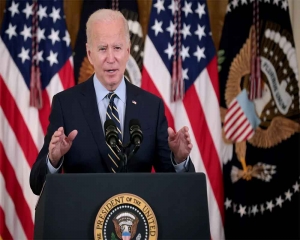Deafness can be detected within four hours of birth and if kids born with such disability are stimulated at an early age with sound, they can learn speech easily, and live their life to the fullest, say doctors.
But despite of availability of latest technology to manage the disability, majority of children in India reach for medical intervention when they are around four-year old, by which time, in most of the cases serious damage could have been done.
"Early detection helps in faster and effective treatments. Parents may not always be able to identify the hearing loss in their children, which is why having Universal Newborn Hearing Screening (UNHS) programme becomes crucial. It is adopted in many countries to solve the problem of hearing disability. It is high time India too go for it," Dr SC Sharma, ENT specialist from AIIMS in Delhi says.
Currently, Kerala is the only state to have successfully achieved 98 per cent UNHS across all Government hospitals.
According to researches, there are 5-6 infants every 1,000 neonates in India who face hearing problems.
Dr Sharma says, "There are many medical interventions like Cochlear implants and hearing aids which can help a child to lead a dignified life."
International cricket legend Brett Lee who is global hearing ambassador for Cochlear-an hearing implant company-was in Delhi on November 14 to bat for making UNHS mandatory in hospitals like it is in countries like the USA, Singapore, Australia and the UK.
Dr Alok Thakkar, ENT specialist from the AIIMS echoed similar views. "The best results with a cochlear implant can be observed if the implantations is done between eight months and 2 years of age as 80 per cent of the brain develops during this period of life. The results of the Cochlear implants done within the age of five will also be good but the child will require a lot of speech therapy," he said.
In fact, Dr Rakesh Kumar, Professor, ENT Department of the country’s premier health institute cited various studies which have found that children who received the implants before they turned 18 months showed speaking ability that stayed close to that of their hearing counterparts.” Children who received the cochlear implant after they turned 3, however, exhibited some gaps when compared to same-age children without hearing loss, the studies have shown,” he said.
A cochlear implant is performed on patients who have lost all or most of their useful hearing in both ears and not benefited by conventional hearing aid. "We have done 900 implants till date. The number is meager against the demand, admitted Dr Kapil Sikka, assistant professor (ENT) AIIMS. There is a waiting list of nine months due to manpower and infrastructure challenges.
Moreover, the fact that cochlear implants come with the cost--starts from Rs. 6.5 lakh and depending on features, goes up to Rs.16 lakh-and parents find difficulty in arranging fund arrangement is not easy, the delay in hearing identification just add to the agony of such kids.
"Poor parents who can't afford the treatment have to find funding agencies. Thankfully, help is coming from NGOs and corporate sector who support the treatment," points out Dr Sikka.
Dr Ashok Kumar, Consultant ENT Surgeon, RML Hospital pitched for reducing cost of the cochlear implants being provided under the Government programme. "Also as there is no provision of maintenance cost after three years of implant, the devices are dumped by the users as they can't afford the extra cost," he says. Cochlear implant is an inner device and has no risk to the life of the patient. The Cochlea is a part of the ear, where sound energy is converted intobio electrical signals and sent to the brain.
This implant is placed on to the patient's skull surgically.
And the electrode inserted into the Cochlea which is attached to the hearing nerve.
Those having severe to profound hearing loss in both ears are chosen for cochlear implant while for others we recommend hearing aids, adds Dr Sikka.
Implanting the Cochlear is not sufficient. After the implant, children also need to be taught to listen and understand. For that to happen, they need to undergo audio therapy for a minimum of two years, he says.
Though the Central Government has made provision to sponsor 500 numbers under its ADIP Scheme, it is minuscule in comparison to actual requirement.

























